Module 1 How to learn English Unit 3 Language in use .教学课件
文档属性
| 名称 | Module 1 How to learn English Unit 3 Language in use .教学课件 |

|
|
| 格式 | zip | ||
| 文件大小 | 1.8MB | ||
| 资源类型 | 教案 | ||
| 版本资源 | 外研版 | ||
| 科目 | 英语 | ||
| 更新时间 | 2014-12-23 20:01:02 | ||
图片预览

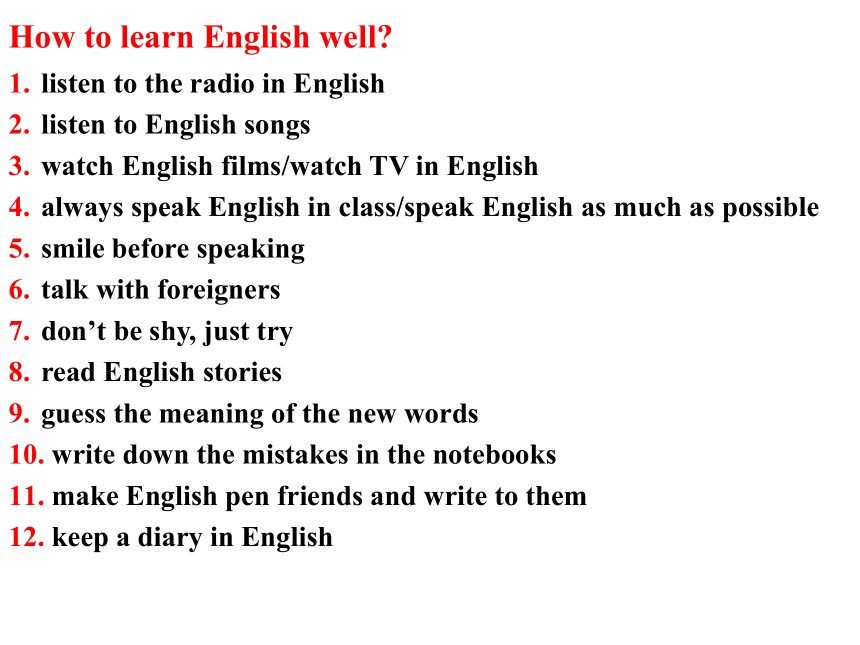
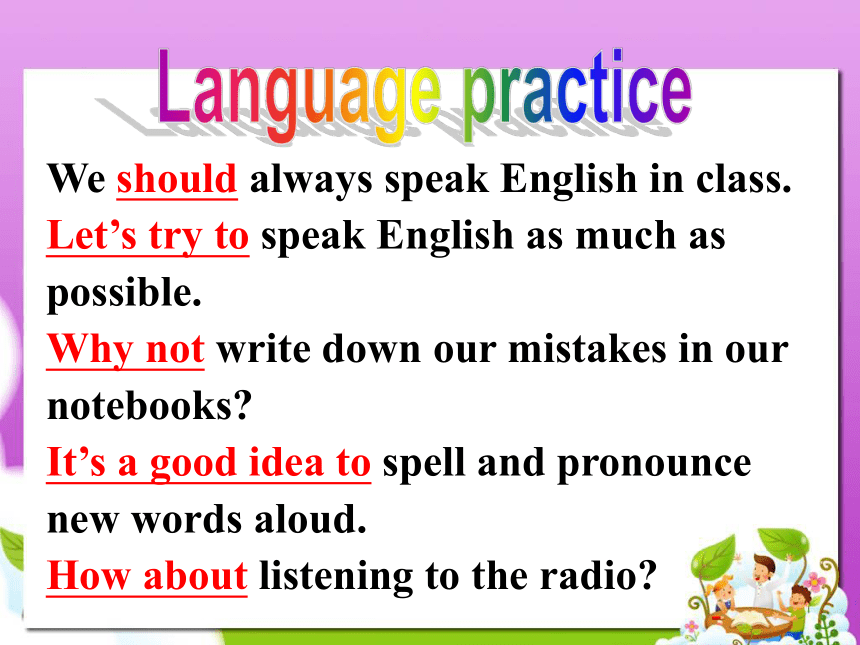
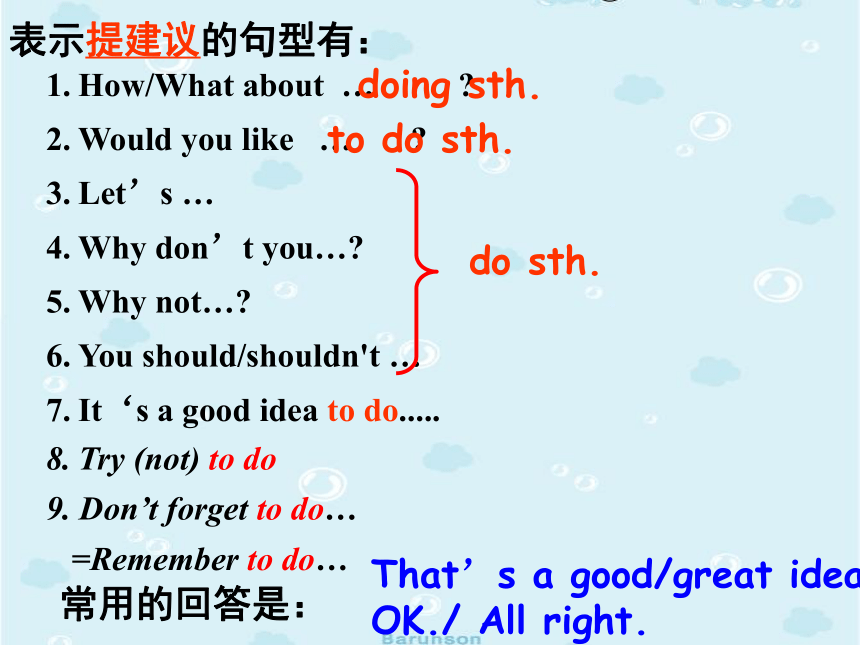

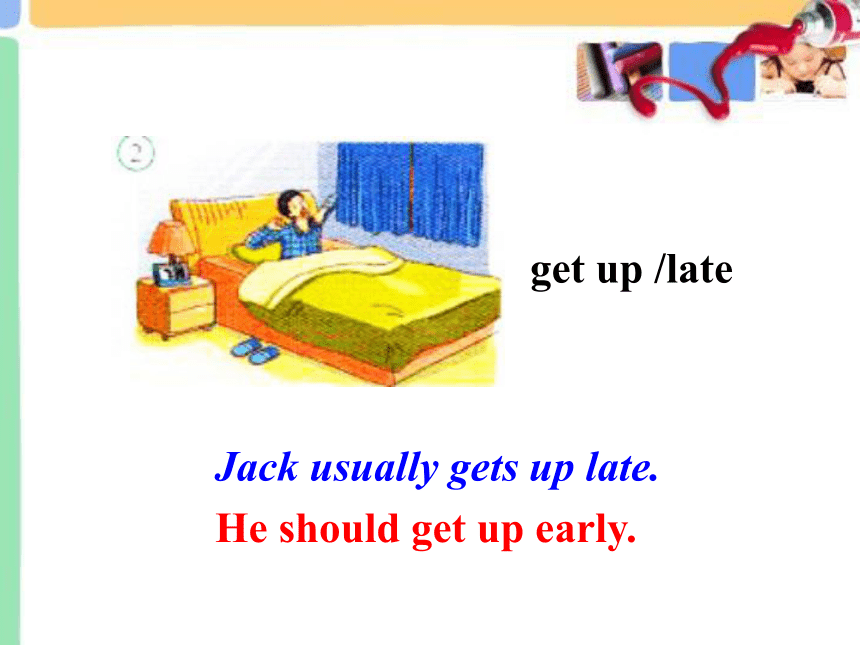


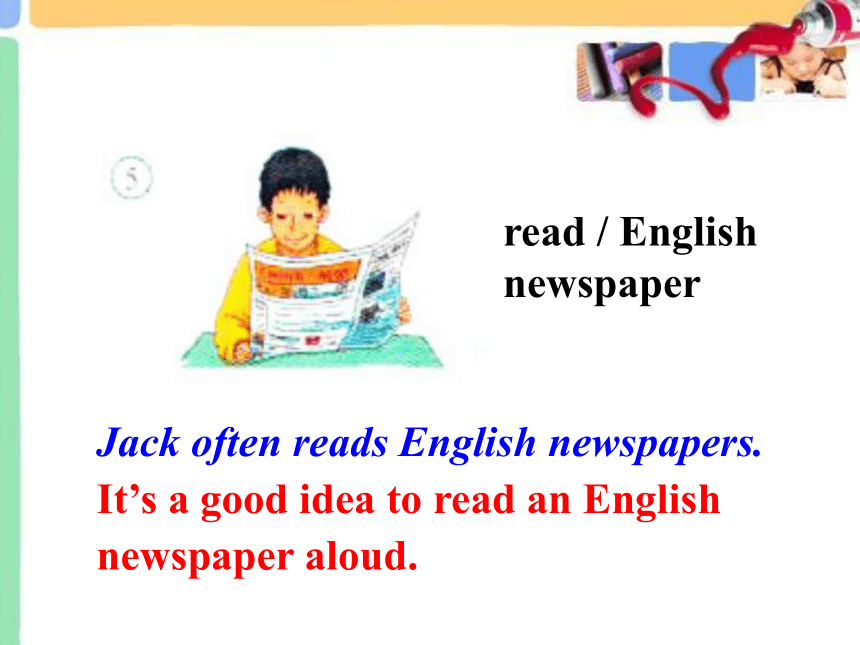



文档简介
课件35张PPT。Unit 3Language in useHow to learn English well?
listen to the radio in English
listen to English songs
watch English films/watch TV in English
always speak English in class/speak English as much as possible
smile before speaking
talk with foreigners
don’t be shy, just try
read English stories
guess the meaning of the new words
write down the mistakes in the notebooks
make English pen friends and write to them
keep a diary in EnglishLanguage practiceWe should always speak English in class.
Let’s try to speak English as much as possible.
Why not write down our mistakes in our notebooks?
It’s a good idea to spell and pronounce new words aloud.
How about listening to the radio?表示提建议的句型有:How/What about … ?
Would you like … ?
Let’s …
Why don’t you…?
Why not…?
You should/shouldn't …
It‘s a good idea to do.....
Try (not) to do
9. Don’t forget to do…
=Remember to do…
doing sth.to do sth. do sth.常用的回答是:That’s a good/great idea.
OK./ All right.go to bed / late Jack usually goes to bed late.
He should go to bed before nine o’clock. get up /late Jack usually gets up late.
He should get up early.Jack usually listens to the teacher carefully.
It’s a good idea to listen to the teacher carefully in class.listen / teacher / carefulJack doesn’t usually use the dictionary.
He should check every letter and translate every word with the dictionary.not use / dictionary read / English newspaper Jack often reads English newspapers.
It’s a good idea to read an English newspaper aloud.write / words / notebook Jack usually writes words in his notebook.
It’s better to write words in your notebook.Give Jack some advice.
He should go to bed before nine o’clock.
____________________________________________________________________________________________________________________________________________From: Helen
To: Diana
Subject: How to improve speaking
Hi Diana,
I like English very much. My reading is good, but my speaking is poor. How can I improve my speaking?
Best,
Helen From: Diana
To: Helen
Subject: Re: How to improve speakingRead Helen’s question and complete Diana’s answer with the correct form of the word and expressions in the box. You need to use some of the expressions more than once.how about should try to
why don’t why notHello, Helen,
You need to practice speaking more often. (1) ___________ you look for some English-speaking people in your town? (2) _____________ saying hello to them and asking them where they come from? (3) __________ make friends with them and take them around your town.
Is there an English club in your town? why don’tHow aboutTry toIf there is not, (4) _________ start one with your friends?( 5) __________ playing a few games and listening to some music? You can watch an English film together, and (6) ________ speaking English all the time. You (7) _________ invite your new English–speaking friends to your club!
Best,
Diana Why notHow abouttry toshould 7. Complete the sentences with the words in the box.Helen: How can I _________ my reading?
James:Here is my (2)_________. Choose a newspaper to read. First, think about what's happening today. What will be in the newspaper? Then read the titles of articles and choose one to read for more information. Don't stop to(3)_________ every word. You don't need to know every word to understand the article.Learning only a few words is enough. Try to use them as much as (4)______. Then you won't (5) _________ them easily.improveadvicecheckpossibleforgetGrammar一般现在时 一般过去时 一般将来时 现在进行时A 一般现在时:
(1) I always read English books.
(表示经常性的行为)
(2) Mary likes watching English films.
(表示目前的爱好)
(3) I want to remember all the new words.
(表示意愿)
(4) Lily is shy. She can’t speak in front of the class.
(表状态)
(5) The sun is bigger than the moon.
(表真理)B 一般过去时:
(1) My teacher told me what I should do.
(表示过去的行为)
(2) I was in Beijing before I came here.
(表示过去的状态)C 一般将来时:
(1) I’m going to work hard this year.
(表示计划、打算干某事)
(2) We will build another library next year.
(表将来的动作或存在的状态)D 现在进行时:
(1) What are you doing at the moment?
(表现在正在进行的动作)
(2) Are you enjoying your stay in China?
(表现阶段正在进行的动作)中考链接Yang Liwei, a famous astronaut _______ to Foshan in March, 2012.
A. comes B. came C. was coming
2. Most of the sandstorm in our country ________ in spring from March to May.
A. happen B. happens
C. is happening3. My sister wants a new dress. She _______ it to the party.
A. wears B. has worn
C. is going to wear
4. -What did you do yesterday evening,
Gina?
-I _____ Titanic 3D in the City Cinema.
A. watch B. watched
C. am watching D. will watch5. — _____ good advice he gave us!
— Yes. He always has so many wonderful ideas.
A. What B. What a C. How D. How a
6. My pen friend, Jack, often helps me _____my English.
A. on B. in C. with D. about
7. Maria finds ______ difficult to translate these sentences.
A. it B. this C. that D. she 8. — Don’t forget their address and telephone number.
— I will _____ in my notebook.
A. write them down B. write it down
C. write down it D. write down them 9. — How do you get on with your English?
— I am ______ at grammar but I don’t do ____ in listening.
A. good; good B. good; well
C. well; good D. well; well10. My cousin is a ______ girl. She is afraid of speaking in front of many people.
A. friendly B. polite
C. shy D. helpful
11. — Your spoken English is really ____.
— Thanks. It’s very nice of you to say so.
A. deep B. excellent
C. basic D. difficult12. She tried ______, but she found it difficult.
A. not to worrying B. to not worry
C. not to worry D. to worry not
13. — What’s your plan for the coming weekend?
— ______ go to fly kites?
A. Why not to B. Why don’t
C. Why don’t we D. How about12. — Don’t forget ______ your dictionary here tomorrow.
— OK. I won’t.
A. taking B. to take
C. bringing D. to bring
13. The boy went to the teachers’ office to _____ his teacher _____ advice about improving his maths.
A. ask; for B. talk; about
C. speak; to D. place; inExercises一、翻译下列短语:
1.谈论某事
与某人交谈
2.一条建议
一些建议
3.尽可能多的讲英语
4.尽力做某事
5.写下
6.犯错误
7.记得要做某事
8.做某事是个好主意talk about sth
talk with sb
a piece of advice
some advice
speak English as much as possible
try (not) to do sth
write down
make a mistake/make mistakes
Don’t forget to do sth
=remember to do sth
It’s a good idea to do sth9.听录音
10.对…有利
11.需要做某事
12开始很了解某事
13.笔友
14.写信给某人
15.同意某人
同意某事
16.练习做某事
17.查找单词listen to the radio
be good for
need to do sth
get to know a lot about sth
pen friends
write to sb
agree with sb
agree on sth
practise doing sth
look upExercises一、翻译下列短语:
1.把…发送给
2.征询建议
3.提高英语
4.基本问题
5.看英文电影
6.听英文歌
7.数次
8.猜…的意思
9.一些新的东西
10.建议某人做某事
11.跟某人谈论某事send sth to sb
ask for advice
improve English
basic question
watch English films
listen to English songs
several times
guess the meaning of
something new
advise sb to do sth
=suggest doing sth
talk about sth with sb12.害怕做某事
13.跟某人讲话
14.开始一段对话
15.向某人微笑
16.别害羞
17.别担心
18.提供建议
19.擅长
20.寻找
21.向…问好
22.与…交朋友
23.带某人四处参观be afraid to do sth
=be afraid of doing sth
speak to sb
start a conversation
smile at sb
Don’t be shy
Don’t worry
give advice
be good at
=do well in
look for
say hello to
make friends with
take sb around swhMake an English study plan for this year. Use the information on Activity 8 to help you.Goodbye
listen to the radio in English
listen to English songs
watch English films/watch TV in English
always speak English in class/speak English as much as possible
smile before speaking
talk with foreigners
don’t be shy, just try
read English stories
guess the meaning of the new words
write down the mistakes in the notebooks
make English pen friends and write to them
keep a diary in EnglishLanguage practiceWe should always speak English in class.
Let’s try to speak English as much as possible.
Why not write down our mistakes in our notebooks?
It’s a good idea to spell and pronounce new words aloud.
How about listening to the radio?表示提建议的句型有:How/What about … ?
Would you like … ?
Let’s …
Why don’t you…?
Why not…?
You should/shouldn't …
It‘s a good idea to do.....
Try (not) to do
9. Don’t forget to do…
=Remember to do…
doing sth.to do sth. do sth.常用的回答是:That’s a good/great idea.
OK./ All right.go to bed / late Jack usually goes to bed late.
He should go to bed before nine o’clock. get up /late Jack usually gets up late.
He should get up early.Jack usually listens to the teacher carefully.
It’s a good idea to listen to the teacher carefully in class.listen / teacher / carefulJack doesn’t usually use the dictionary.
He should check every letter and translate every word with the dictionary.not use / dictionary read / English newspaper Jack often reads English newspapers.
It’s a good idea to read an English newspaper aloud.write / words / notebook Jack usually writes words in his notebook.
It’s better to write words in your notebook.Give Jack some advice.
He should go to bed before nine o’clock.
____________________________________________________________________________________________________________________________________________From: Helen
To: Diana
Subject: How to improve speaking
Hi Diana,
I like English very much. My reading is good, but my speaking is poor. How can I improve my speaking?
Best,
Helen From: Diana
To: Helen
Subject: Re: How to improve speakingRead Helen’s question and complete Diana’s answer with the correct form of the word and expressions in the box. You need to use some of the expressions more than once.how about should try to
why don’t why notHello, Helen,
You need to practice speaking more often. (1) ___________ you look for some English-speaking people in your town? (2) _____________ saying hello to them and asking them where they come from? (3) __________ make friends with them and take them around your town.
Is there an English club in your town? why don’tHow aboutTry toIf there is not, (4) _________ start one with your friends?( 5) __________ playing a few games and listening to some music? You can watch an English film together, and (6) ________ speaking English all the time. You (7) _________ invite your new English–speaking friends to your club!
Best,
Diana Why notHow abouttry toshould 7. Complete the sentences with the words in the box.Helen: How can I _________ my reading?
James:Here is my (2)_________. Choose a newspaper to read. First, think about what's happening today. What will be in the newspaper? Then read the titles of articles and choose one to read for more information. Don't stop to(3)_________ every word. You don't need to know every word to understand the article.Learning only a few words is enough. Try to use them as much as (4)______. Then you won't (5) _________ them easily.improveadvicecheckpossibleforgetGrammar一般现在时 一般过去时 一般将来时 现在进行时A 一般现在时:
(1) I always read English books.
(表示经常性的行为)
(2) Mary likes watching English films.
(表示目前的爱好)
(3) I want to remember all the new words.
(表示意愿)
(4) Lily is shy. She can’t speak in front of the class.
(表状态)
(5) The sun is bigger than the moon.
(表真理)B 一般过去时:
(1) My teacher told me what I should do.
(表示过去的行为)
(2) I was in Beijing before I came here.
(表示过去的状态)C 一般将来时:
(1) I’m going to work hard this year.
(表示计划、打算干某事)
(2) We will build another library next year.
(表将来的动作或存在的状态)D 现在进行时:
(1) What are you doing at the moment?
(表现在正在进行的动作)
(2) Are you enjoying your stay in China?
(表现阶段正在进行的动作)中考链接Yang Liwei, a famous astronaut _______ to Foshan in March, 2012.
A. comes B. came C. was coming
2. Most of the sandstorm in our country ________ in spring from March to May.
A. happen B. happens
C. is happening3. My sister wants a new dress. She _______ it to the party.
A. wears B. has worn
C. is going to wear
4. -What did you do yesterday evening,
Gina?
-I _____ Titanic 3D in the City Cinema.
A. watch B. watched
C. am watching D. will watch5. — _____ good advice he gave us!
— Yes. He always has so many wonderful ideas.
A. What B. What a C. How D. How a
6. My pen friend, Jack, often helps me _____my English.
A. on B. in C. with D. about
7. Maria finds ______ difficult to translate these sentences.
A. it B. this C. that D. she 8. — Don’t forget their address and telephone number.
— I will _____ in my notebook.
A. write them down B. write it down
C. write down it D. write down them 9. — How do you get on with your English?
— I am ______ at grammar but I don’t do ____ in listening.
A. good; good B. good; well
C. well; good D. well; well10. My cousin is a ______ girl. She is afraid of speaking in front of many people.
A. friendly B. polite
C. shy D. helpful
11. — Your spoken English is really ____.
— Thanks. It’s very nice of you to say so.
A. deep B. excellent
C. basic D. difficult12. She tried ______, but she found it difficult.
A. not to worrying B. to not worry
C. not to worry D. to worry not
13. — What’s your plan for the coming weekend?
— ______ go to fly kites?
A. Why not to B. Why don’t
C. Why don’t we D. How about12. — Don’t forget ______ your dictionary here tomorrow.
— OK. I won’t.
A. taking B. to take
C. bringing D. to bring
13. The boy went to the teachers’ office to _____ his teacher _____ advice about improving his maths.
A. ask; for B. talk; about
C. speak; to D. place; inExercises一、翻译下列短语:
1.谈论某事
与某人交谈
2.一条建议
一些建议
3.尽可能多的讲英语
4.尽力做某事
5.写下
6.犯错误
7.记得要做某事
8.做某事是个好主意talk about sth
talk with sb
a piece of advice
some advice
speak English as much as possible
try (not) to do sth
write down
make a mistake/make mistakes
Don’t forget to do sth
=remember to do sth
It’s a good idea to do sth9.听录音
10.对…有利
11.需要做某事
12开始很了解某事
13.笔友
14.写信给某人
15.同意某人
同意某事
16.练习做某事
17.查找单词listen to the radio
be good for
need to do sth
get to know a lot about sth
pen friends
write to sb
agree with sb
agree on sth
practise doing sth
look upExercises一、翻译下列短语:
1.把…发送给
2.征询建议
3.提高英语
4.基本问题
5.看英文电影
6.听英文歌
7.数次
8.猜…的意思
9.一些新的东西
10.建议某人做某事
11.跟某人谈论某事send sth to sb
ask for advice
improve English
basic question
watch English films
listen to English songs
several times
guess the meaning of
something new
advise sb to do sth
=suggest doing sth
talk about sth with sb12.害怕做某事
13.跟某人讲话
14.开始一段对话
15.向某人微笑
16.别害羞
17.别担心
18.提供建议
19.擅长
20.寻找
21.向…问好
22.与…交朋友
23.带某人四处参观be afraid to do sth
=be afraid of doing sth
speak to sb
start a conversation
smile at sb
Don’t be shy
Don’t worry
give advice
be good at
=do well in
look for
say hello to
make friends with
take sb around swhMake an English study plan for this year. Use the information on Activity 8 to help you.Goodbye
同课章节目录
- Module 1 How to learn English
- Unit 1 Let's try to speak English as much as possi
- Unit 2 You should smile at her.
- Unit 3 Language in use .
- Module 2 My home town and my country
- Unit 1 It's taller than many other buildings.
- Unit 2 Cambridge is a beautiful city in the east o
- Unit 3 Language in use .
- Module 3 Sports.
- Unit 1 Nothing is more exciting than playing tenni
- Unit 2 This year we training more carefully.
- Unit 3 Language in use .
- Module 4 Planes, ships and trains .
- Unit 1 He lives the farthest from school.
- Unit 2 What is the best way to travel.
- Unit 3 Language in use .
- Module 5 Lao She Teahouse.
- Unit 1 I wanted to see the Beijing Opera.
- Unit 2 It descibes the changes in Chinese society.
- Unit 3 Language in use .
- Module 6 Animals in danger.
- Unit 1 It allows people to get closer to them .
- Unit 2 The WWF is working hard to save them all.
- Unit 3 Language in use .
- Revision module A
- Module 7 A famous story
- Unit 1 Alice was sitting with her sister by the ri
- Unit 2 She was thinking about her cat.
- Unit 3 Language in use .
- Module 8 Accidents
- Unit 1 While the car were changing to red, a car s
- Unit 2 I was trying to pick it up when it bite me
- Unit 3 Language in use .
- Module 9 Population
- Unit 1 The population of China is about 1.37 billi
- Unit 2 Arnwick was a city with 200,000 people.
- Unit 3 Language in use .
- Module 10 The weathe
- Unit 1 It might snow.
- Unit 2 The weather is fine all year round.
- Unit 3 Language in use .
- Module 11 Way of life
- Unit 1 In China ,we open a gift later.
- Unit 2 In England, you usually drink tea with milk
- Unit 3 Language in use .
- Module 12 Help
- Unit 1 What should we do before help arrives?
- Unit 2 Stay away from windows and heavy furniture.
- Unit 3 Language in use .
- Revision module B
